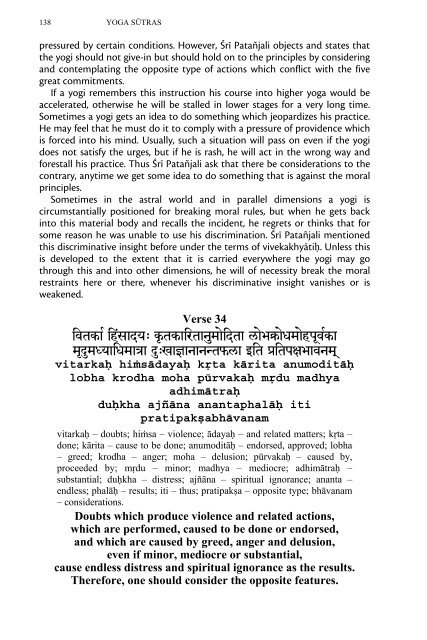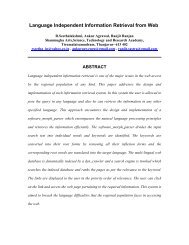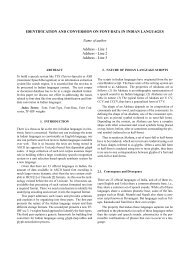Create successful ePaper yourself
Turn your PDF publications into a flip-book with our unique Google optimized e-Paper software.
138 YOGA SŪTRAS<br />
pressured by certain conditions. However, Śrī Patañjali objects and states that<br />
the yogi should not give-in but should hold on to the principles by considering<br />
and contemplating the opposite type of actions which conflict with the five<br />
great commitments.<br />
If a yogi remembers this instruction his course into higher yoga would be<br />
accelerated, otherwise he will be stalled in lower stages for a very long time.<br />
Sometimes a yogi gets an idea to do something which jeopardizes his practice.<br />
He may feel that he must do it to comply with a pressure of providence which<br />
is forced into his mind. Usually, such a situation will pass on even if the yogi<br />
does not satisfy the urges, but if he is rash, he will act in the wrong way and<br />
forestall his practice. Thus Śrī Patañjali ask that there be considerations to the<br />
contrary, anytime we get some idea to do something that is against the moral<br />
principles.<br />
Sometimes in the astral world and in parallel dimensions a yogi is<br />
circumstantially positioned for breaking moral rules, but when he gets back<br />
into this material body and recalls the incident, he regrets or thinks that for<br />
some reason he was unable to use his discrimination. Śrī Patañjali mentioned<br />
this discriminative insight before under the terms of vivekakhyātiḥ. Unless this<br />
is developed to the extent that it is carried everywhere the yogi may go<br />
through this and into other dimensions, he will of necessity break the moral<br />
restraints here or there, whenever his discriminative insight vanishes or is<br />
weakened.<br />
Verse 34<br />
ivtkaR ih k«tkairtanumaeidta lae-³aexmaehpUvRka<br />
m&ÊmXyaixmaÇa Ê>oa}ananNt)la #it àitp]-avnm!<br />
vitarkaḥ hiṁsādayaḥ kṛta kārita anumoditāḥ<br />
lobha krodha moha pūrvakaḥ mṛdu madhya<br />
adhimātraḥ<br />
duḥkha ajñāna anantaphalāḥ iti<br />
pratipakṣabhāvanam<br />
vitarkaḥ – doubts; hiṁsa – violence; ādayaḥ – and related matters; kṛta –<br />
done; kārita – cause to be done; anumoditāḥ – endorsed, approved; lobha<br />
– greed; krodha – anger; moha – delusion; pūrvakaḥ – caused by,<br />
proceeded by; mṛdu – minor; madhya – mediocre; adhimātraḥ –<br />
substantial; duḥkha – distress; ajñāna – spiritual ignorance; ananta –<br />
endless; phalāḥ – results; iti – thus; pratipakṣa – opposite type; bhāvanam<br />
– considerations.<br />
Doubts which produce violence and related actions,<br />
which are performed, caused to be done or endorsed,<br />
and which are caused by greed, anger and delusion,<br />
even if minor, mediocre or substantial,<br />
cause endless distress and spiritual ignorance as the results.<br />
Therefore, one should consider the opposite features.










